First Impressions – Dororo (2019)
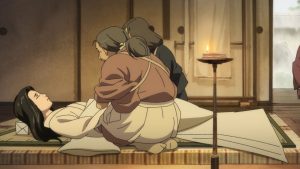 Let me just say for the record that I had a shit-eating grin on my face through most of the premiere of Dororo, which is always a nice feeling. It was one of those first episodes which just nails every note, every pause, every tempo change. That doesn’t always mean the feeling is going to last, as making a great premiere is a different matter than making a great series. But with no less than Tezuka Osamu behind the story, if ever there was a case of a series that should have staying power you’d think Dororo would be the one.
Let me just say for the record that I had a shit-eating grin on my face through most of the premiere of Dororo, which is always a nice feeling. It was one of those first episodes which just nails every note, every pause, every tempo change. That doesn’t always mean the feeling is going to last, as making a great premiere is a different matter than making a great series. But with no less than Tezuka Osamu behind the story, if ever there was a case of a series that should have staying power you’d think Dororo would be the one.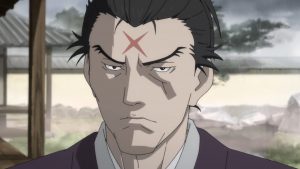 My expectations for this show were pretty high, but it would be fair to say this premiere exceeded them. Hell, it was so good it’s even MAL readers liked it despite it not being an isekai, cute girls show or sequel. Pedigree speaks volumes – any Tezuka, even lesser-stature, counts for a lot. The godfather of action anime, Furuhashi Kazuhiro (Rurouni Kenshin) directing. MAPPA and Tezuka Productions teaming up. Hell, even something like getting Koike Takeshi (Redline, Afro Samurai) to direct the OP – which managed to be stunning despite the song itself being rather pedestrian.
My expectations for this show were pretty high, but it would be fair to say this premiere exceeded them. Hell, it was so good it’s even MAL readers liked it despite it not being an isekai, cute girls show or sequel. Pedigree speaks volumes – any Tezuka, even lesser-stature, counts for a lot. The godfather of action anime, Furuhashi Kazuhiro (Rurouni Kenshin) directing. MAPPA and Tezuka Productions teaming up. Hell, even something like getting Koike Takeshi (Redline, Afro Samurai) to direct the OP – which managed to be stunning despite the song itself being rather pedestrian.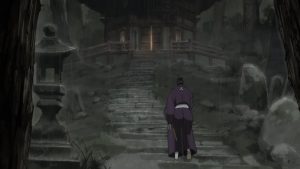 Furuhashi isn’t a panacea – he needs to have the right material to succeed. But if there were ever a case of horses for courses it’s Furuhashi and Dororo, and you can feel his confidence with the material seep through every pore of the premiere. Also of note is the look of the series, which is classic Tezuka character designs and fluid and stylish animation against a backdrop that looks like a series of wall scrolls hanging in a temple or palace somewhere (art direction is by Fujino Mari and background design from rising stars Studio Pablo). Veteran Ike Yoshihiro provides the soundtrack, which seamlessly adds to the story without ever threatening to overwhelm it.
Furuhashi isn’t a panacea – he needs to have the right material to succeed. But if there were ever a case of horses for courses it’s Furuhashi and Dororo, and you can feel his confidence with the material seep through every pore of the premiere. Also of note is the look of the series, which is classic Tezuka character designs and fluid and stylish animation against a backdrop that looks like a series of wall scrolls hanging in a temple or palace somewhere (art direction is by Fujino Mari and background design from rising stars Studio Pablo). Veteran Ike Yoshihiro provides the soundtrack, which seamlessly adds to the story without ever threatening to overwhelm it.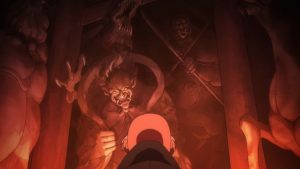 In short, it’s all great – if any anime could ever be timeless it would be a Tezuka adaptation, and Dororo answers the bell. Here he spins the tale of a daimyou named Kagemitsu Daigo (Uchida Naoya) in the early Warring States period whose lands are beset by plagues, poverty and general despair. He goes to a temple and enters the “Hall of Hell” where, after slaying the priest (whose last words are a chilling expression of gratitude for being killed before the atrocious state of the world and the futility of his prayers can make him doubt the Buddha), offers a bargain – he’ll give anything of his in exchange for prosperity for his lands and power for himself. Given that his wife was pregnant at the time, it’s hard to imagine Daigo didn’t have some idea of what might be involved.
In short, it’s all great – if any anime could ever be timeless it would be a Tezuka adaptation, and Dororo answers the bell. Here he spins the tale of a daimyou named Kagemitsu Daigo (Uchida Naoya) in the early Warring States period whose lands are beset by plagues, poverty and general despair. He goes to a temple and enters the “Hall of Hell” where, after slaying the priest (whose last words are a chilling expression of gratitude for being killed before the atrocious state of the world and the futility of his prayers can make him doubt the Buddha), offers a bargain – he’ll give anything of his in exchange for prosperity for his lands and power for himself. Given that his wife was pregnant at the time, it’s hard to imagine Daigo didn’t have some idea of what might be involved.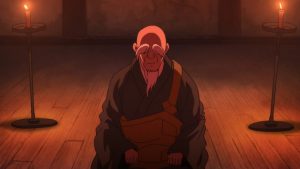 When Daigo’s son is born, he’s a terrifying apparition, with so skin or organs yet somehow alive. To his wife’s horror Daigo orders the baby to be destroyed but the kindly old midwife (who clearly has experience with this, as those in her position certainly would) offers the baby a chance by setting him adrift in a boat rather than on the water. She’s immediately eaten by a terrifying ayakashi, who’s in turn slain by a shamisen-wielding blind samurai, and the story flashes forward to 16 years later where we meet two key figures. First is Jukai (the peerless Ohtsuka Akio), a doctor who gives prosthetics to the dead on the battlefield. And the second is Dororo (Suzuki Rio), a brash young thief in the process of being beaten and drowned by three men from the caravan he’s just robbed.
When Daigo’s son is born, he’s a terrifying apparition, with so skin or organs yet somehow alive. To his wife’s horror Daigo orders the baby to be destroyed but the kindly old midwife (who clearly has experience with this, as those in her position certainly would) offers the baby a chance by setting him adrift in a boat rather than on the water. She’s immediately eaten by a terrifying ayakashi, who’s in turn slain by a shamisen-wielding blind samurai, and the story flashes forward to 16 years later where we meet two key figures. First is Jukai (the peerless Ohtsuka Akio), a doctor who gives prosthetics to the dead on the battlefield. And the second is Dororo (Suzuki Rio), a brash young thief in the process of being beaten and drowned by three men from the caravan he’s just robbed.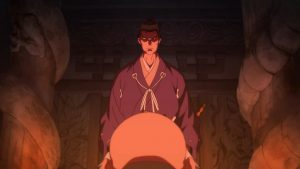 While there isn’t a lot of exposition from explanation here (obviously), it really isn’s needed – it’s easy to see how Tezuka fits these pieces together. The young swordsman with the doll-like face who saves Dororo – not from the traders, but the sludge monster who appears from the river and devours them – has no name or voice yet, but we certainly know who he is. And who raised him. It’s quite telling that after slaying the river monster the youth seems to regrow his skin – and at that moment we see that things are starting to go badly for Daigo’s now wealthy domains, where a son (quite human this time) named Tahoumaru (Chiba Shouya) is dutifully trying to care for Daigo’s sickly wife.
While there isn’t a lot of exposition from explanation here (obviously), it really isn’s needed – it’s easy to see how Tezuka fits these pieces together. The young swordsman with the doll-like face who saves Dororo – not from the traders, but the sludge monster who appears from the river and devours them – has no name or voice yet, but we certainly know who he is. And who raised him. It’s quite telling that after slaying the river monster the youth seems to regrow his skin – and at that moment we see that things are starting to go badly for Daigo’s now wealthy domains, where a son (quite human this time) named Tahoumaru (Chiba Shouya) is dutifully trying to care for Daigo’s sickly wife.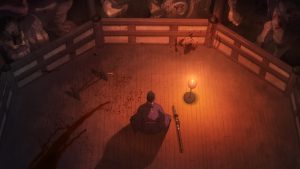 A powerful and timeless story, a legendary director and gorgeous production – what could possibly go wrong with Dororo? Well – it’d be nice to think that this series wouldn’t have been produced without the intent to do a full adaptation, but we have no episode count so who knows? One need look no further than Karakuri Circus to see what insane compression levels can to to an adaptation of a long-finished manga. There’s budget, too – we’ve seen MAPPA blow their load early and have things crater before (though never catastrophically). Still, it’s hard to stand in awe of a first episode this good and not feel optimistic about Dororo’s chances – clearly the potential for something very, very special exists here.
A powerful and timeless story, a legendary director and gorgeous production – what could possibly go wrong with Dororo? Well – it’d be nice to think that this series wouldn’t have been produced without the intent to do a full adaptation, but we have no episode count so who knows? One need look no further than Karakuri Circus to see what insane compression levels can to to an adaptation of a long-finished manga. There’s budget, too – we’ve seen MAPPA blow their load early and have things crater before (though never catastrophically). Still, it’s hard to stand in awe of a first episode this good and not feel optimistic about Dororo’s chances – clearly the potential for something very, very special exists here.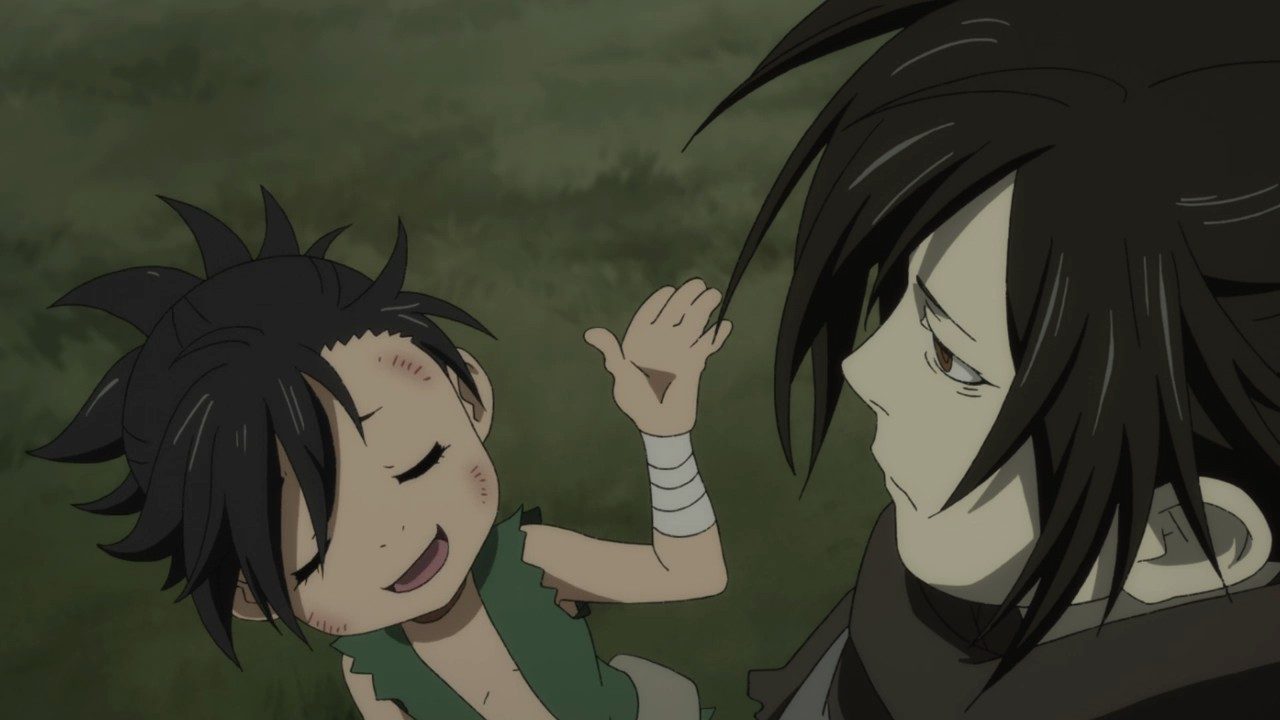
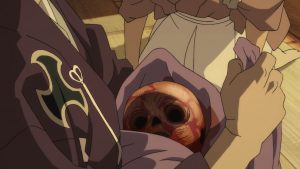
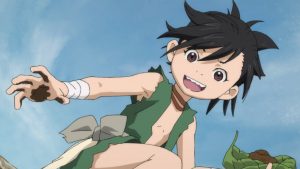
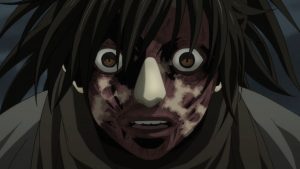
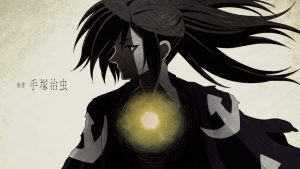
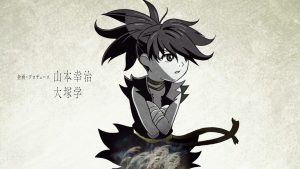
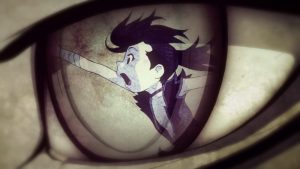
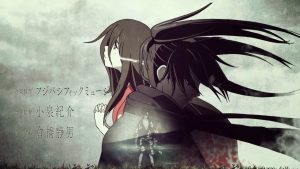
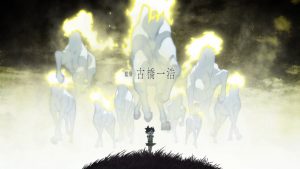
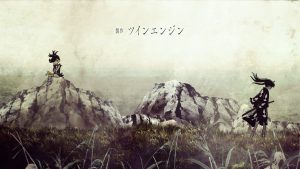
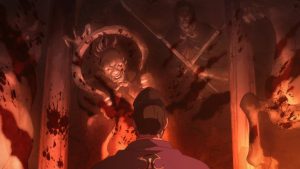
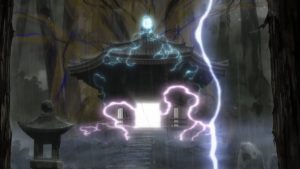
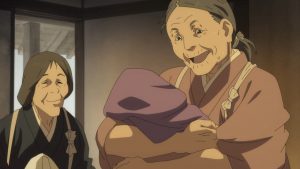
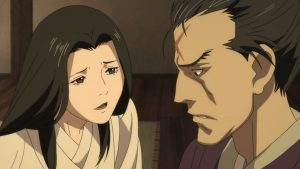
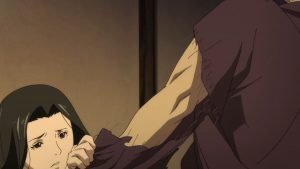
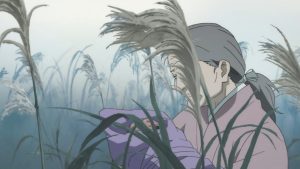
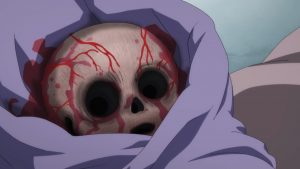
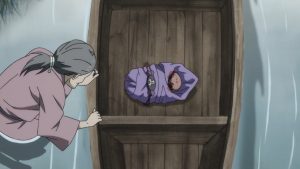
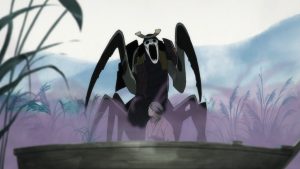
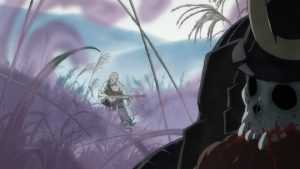
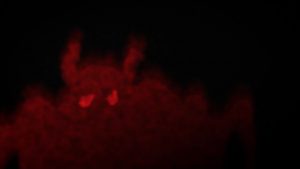
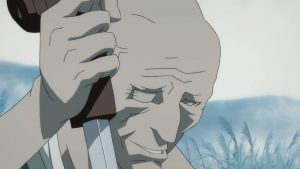
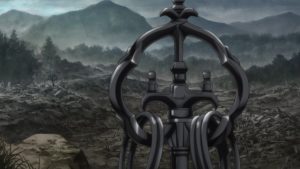
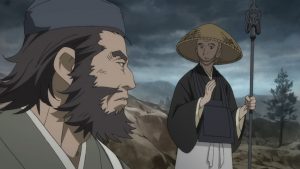
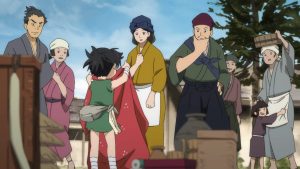
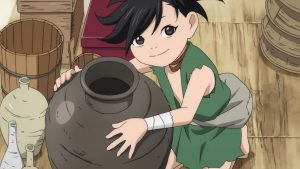
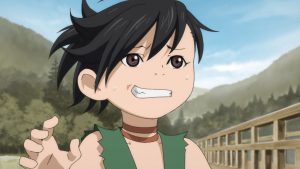
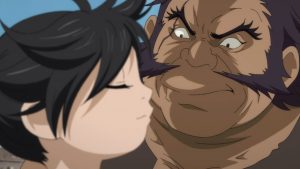
Post a Comment